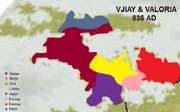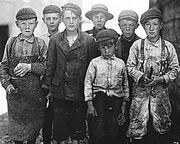| Whoops! This page is no longer canon! |
|---|
| Vapor has been around since 2012. Since then, we've had many key players come and go, as well as a significant reboot in 2018, which has left many articles contained in this wiki out-of-date or entirely non-canon. Rather than simply remove parts of our history that no longer apply, we have decided to preserve them in our "Legends Canon," so that they may exist outside of Vapor's proper and current canon history. This is one of those articles. |
| The Rightful Queendom of | |
|---|---|
Vjiay
 Flag of Vjiay  Major Cities and Military bases of Vjiay and Valoria | |
Detailed Information
| |
| Capital City | Urbaurum |
| Largest City | Urbaurum |
| Leader | Queen Olivia II |
| Official Languages
(de jure) |
English, Latin |
| National Languages
(de facto) |
English, Latin |
| Ethnic Groups | 89% Caucasian 8% Black |
| Demonym | Vjiayan |
| Government Type | Constitutional Monarchy |
| Area | 1,842,802 km2 |
| Population | 52 million |
| GDP | Unknown |
| HDI | Unknown |
| Currency | Bit |
| Time Zone(s) | RMT-3 to RMT-5 |
| Date Format | dd-mm-yyyy |
Overview[]
Vjiay is a Sovereign State in North-West Amplector, bordering Vitzenburg and Wirbel. Vjiay has a sea border with the Caeruleus to the North and the Levidius to the South. The Vjiayan homeland, home of the Vjiayan people and birthplace of The Queendom, covers an approximate area of over 1.8 million square kilometres, though this number increases if the Dominion of Valoria is included. Its general geography consists of lowland areas with more mountainous areas in the centre and to the North-East of the mainland. The country’s highest peak is Dobr’s Spear, standing at 1,236 metres.
It’s government is a Constitutional Monarchy with a Two-Tier Parliamentary system. It’s Capital City is Urbaurum, located in the centre-south part of the country.
Vjiay is a highly developed country with strong regional standing and an ability to project power globally. It is one of the strongest economies in Amplector and is heavily industrialised.
The Queendom[]
The Queendom comprises of the Nations, Dominions, Colonies, Protectorates and other territories such as Forts, Bases and Trading posts ruled by Vjiay. Originally it referred to Vjiay alone, but with expansion into Valoria the "Shining Bounds" (The borders of the Queendom referred to by the National Anthem of Vjiay, I vow to thee, My Country and popularized by a speech by William Pelly in 1892) have increased, with all territorial possessions of Vjiay now known as the Queendom.
There are current ongoing efforts to disover areas to use as penal colonies as the increasing civilian settlement and urbanisation of Valoria has now made it unreasonable for that colony to be used for such a purpose.
Exploration by Government funded teams into Northern Promethia and Eastern Zhao have also reported a rich array of resources useful to the Queendom. It is rumoured that the Vjiayan Government is keen to expand into these rich areas.
History[]
Monarchy[]

The Vjiayan Monarchy can trace its history back over a millennia, its ancestors being the Kings of Dulan and the Princes of Valoria.
The area now known as the Vjiayan mainland was once fought over by a number of factions and petty kingdoms, with the North-Western Kingdom of Dulan emerging as the most powerful around the seventh century, which most scholars agree was in part thanks to the fact that a number of its rivals were busy bickering amongst themselves, whereas the diplomatically sound Dulanites enjoyed relative peace and prosperity.
The expansionist period came with the arising of the Vjiayan Monarchs in Dulan, a family with a long history of

association with the Kingdoms of Reija and Soit. Within one-hundred-and-sixty-five years the two smaller Kingdoms had agreed to be annexed by and become a part of the Kingdom of Dulan. In the same period, successive aggressive Monarchs had solidified the Dulan foothold in Southern Valoria and it was a well known fact that they wished to secure that land for their name. The annexation of Reija and Soit, however, had ruffled the feathers of the powerful Jager Kingdom, which demanded in 780 that no further expansion take place, or else there would be war. Most realized that a clash between these two powers would be biblical in scale and for thirty years there was an uneasy and suspicious peace. In 810 though, thanks to some behind-closed-doors political dealings between the Vjiayan King, Oscar, and the Prince of Limfor, Jed, the Dulanites surprised the Jagers and invaded their territory, enacting a scorched earth policy and leaving few survivors. The Jagers, greatly embarrassed and vengeful responded viciously and quickly. The war raged for decades, depleting resources and claiming the lives of hundreds of thousands of men, women and children. By 836 the Dulanites had only pushed back the Jagers a few hundred miles.

The Jagers were close to breaking however. Traitors in the midst of their councils and their Monarchy reduced their power significantly and the Dulanites capitalized. With the alliance with Limfor still in place (who had themselves began expansion into Dorney) and with little resistance to stop them, the Dulanites, in 900, claimed the Jager Kingdom for their own. This was the year that the first mention of the “Vjiayan Kingdom” is found in a declaration by the then King, Oscar II, which explained that the Dulanite Kingdom would be renamed after its successful Monarchy. There seems to have been a few grumblings amongst the people about this who feared a loss of identity, but the magnificent achievements of the successive Kings had impressed into many of them that it was thoroughly acceptable.

The next one-hundred years saw peace on what is now the Vjiayan mainland. The Vjiayans - the Dulanites new moniker - focused their efforts on expansion into Valoria, whilst leaving the Limfor kings to expand eastwards. Little ground was made in Valoria, mostly due to the need of recovery after the war with Jager.
Although the Vjiayans and the Kingdom of Limfor were still technically allied, the growth of the latter troubled the Vjiayans. By 1150 Limfor had seized much of Rosney and its military might was growing. The Vjiayans decided to act.
Led by Anne, the first Queen of the country, they began their assaults. With their focus on the East, the Limforians could do little to respond to this new threat, and the Vjiayans made ground extremely quickly. Entering the Kingdom in 1175, the Vjiayans controlled vast tracts of Western Limfor by 1190 and continued their expansion through the next century though with increased difficulty as the Limforians were able to respond.

Again, the war ploughed on and took over the economies of the combatants, costing billions and hundreds of thousands of men. Short periods of peace whilst they each caught their breath was intermingled with the fray, but everyone knew it would only end when there was a definite winner.
The war lasted over two-hundred years, but the Vjiayans finally took control of the last piece of the Limfor Kingdom in 1400.
With this mighty new Kingdom bearing down on it, the Rosnite Principality agreed to be annexed in 1409 and the Vjiayans obliged, with the Treaty of Rosnite.

Culture and Population[]
People
The people of Vjiay are known for their sensibilities and, to an extent, their self-confidence. The Laissez-Faire attitude of successive governments has permeated all of Vjiayan society, which leads to the lower classes showing a noticeable deference to those above them. This phenomenon, which can and has lead to an exploitation of the masses by the few in historical Vjiay and indeed all across the planet, is further astounding by the fact that the upper classes show a great sense of responsibility for those below them.
This, to an extent, can be attributed to the extreme social Darwinism that is the basis of Vjiayan society. Survival of the fittest is a given. Those who try to succeed; will succeed; those who don’t, won’t. Oddly, this has not lead to the disdain shown to the Lower Classes by the Upper Classes as seen in other nations, but rather the opposite. The Upper Classes see it as their responsibility to not only look after the people below them (cynics call this ‘petting’), but to actually help them to succeed. There are numerous examples all over Vjiay of philanthropy and charity, leading to the increased living standards of a community or workforce. Sociologists have suggested that, having been a nation of workers during the Federal years, the aristocracy of present collectively remembers their rise to power from low positions and, whilst ensuring that their own position is secure, in general look to improve the lives of those below them.
Most people in Vjiay now live in towns and cities, usually quite near to or even next to their place of work. The ‘workers village’ was a popular trend in the 1850s, with factory owners building villages for their workers to rent next to their factories. Up to 90% of people who lives in towns and cities live in terraced houses, often with a family to each floor. Almost all people have access to clean water in at least one area on their street. Unfortunately, people in houses which are away from factories can often find it difficult to find work and this has resulted in the development of slum areas. This has also happened around factories that have closed down recently.
Children can be put to work as young as ten, though there is a minimum age of fourteen in particularly

Children at work in a open cast pit in Fyars
dangerous jobs such as deep mining. Children are required to be in education (free and provided by the state from 1868) from the age of six to fourteen, though the middle classes are often tutored more, whilst the upper classes are tutored privately, often until the end of their teenage years. Religion makes up only a small percentage of the curriculum and is generally taught in a negative light, with enlightened thinkers and historical figures being venerated.
Law and Order
As said, discipline and deference are cornerstones of Vjiayan society. As a result of this, much respect is given to the Police Service of the country, which was founded in the early nineteenth century, making it one of the oldest police forces in the region. Officers are frequently seen patrolling town and cities on foot, in their trademark black cloaks and custodian helmets. Standard issue equipment includes an extendable baton and whistles.

A cycle troop of the Hargate Police Constabulary
Low level criminals such as pickpockets and vandals are given public work orders which can include street or river cleaning, whilst more serious offences can lead to jail terms either in the country’s land prisons or prison ships. A small number of criminals are deported, usually to camps ran in conjunction with other nations. The death penalty, usually by hanging, is only applicable to those found guilty of treason.